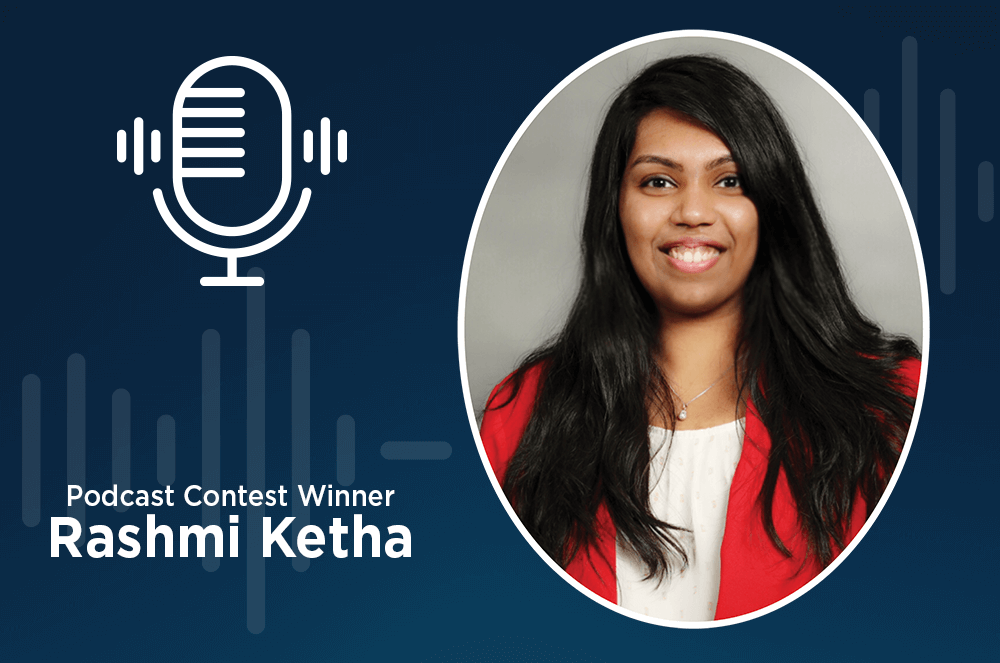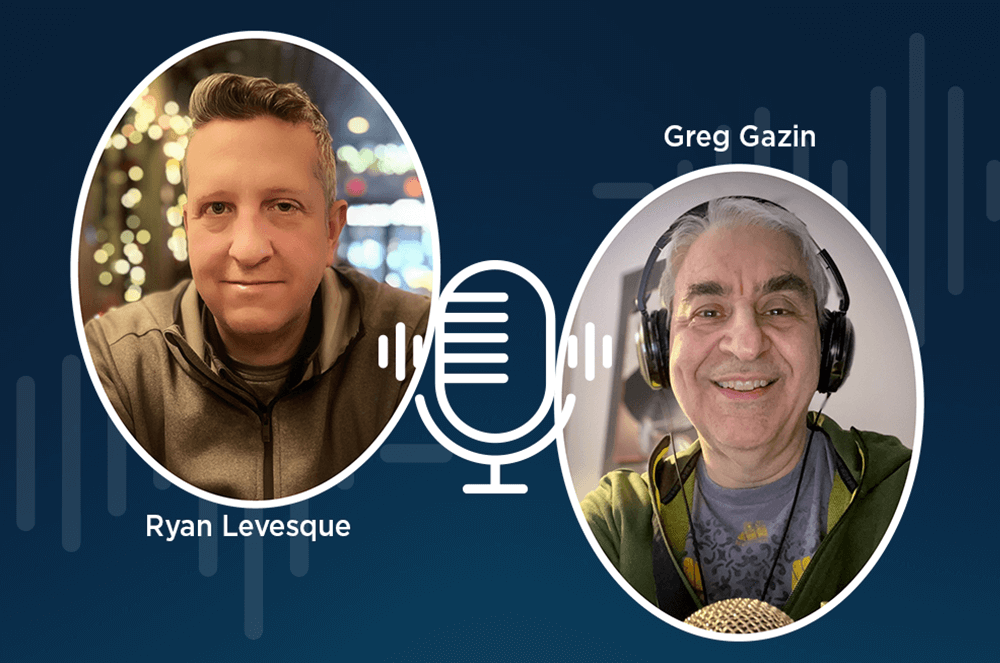
In this Toastmasters Podcast episode, co-hosts Greg Gazin, DTM, and Ryan Levesque, DTM, reminisce about lessons learned, memorable episodes, miscues, and more.
Twice each month you can hear two Toastmasters engaged in conversation with inspiring guests from around the globe. Sometimes it’s with the International President of Toastmasters or the new World Champion; other times it’s with a doctor, comedian, or beauty queen. The podcast episodes are often filled with laughter and authentic dialogue.
Behind the scenes, the two 21-year members from different countries work hard to make it look seamless. Distinguished Toastmasters Greg Gazin and Ryan Levesque are the co-hosts who bring The Toastmasters Podcast to life. Read on to learn more about how this series began, what goes into the making of it, and some of their favorite episodes over the years.
How did the podcast get started?
Ryan: In 2007, my friend and business partner Bo Bennett began an unofficial podcast for Toastmasters. In 2009, after a track record of about 50 episodes, Toastmasters International contacted us to host an official podcast for the organization, and The Toastmasters Podcast was born.
Our first episode came out in August 2009, prior to the International Convention in Mashantucket, Connecticut, and then our next three episodes were recorded on-site from the convention. Fun fact: we met fellow podcaster Greg at that convention, and he was a guest on episode two! After guest-hosting a couple of episodes, he joined us as a third host in 2014. In 2019, Bo decided to step back, maintaining the ToastmastersPodcast.com website, while Greg and I handled the interviews and production.
Help us get to know you a little better.
Greg: I live in Edmonton, Alberta, Canada, and have been a Toastmaster for exactly 21 years. I am a six-time DTM, Past District Governor (Director), and a proud member of New Entrepreneurs Toastmasters Club.
Professionally, I’m a syndicated technology and lifestyle columnist for Troy Media, speaker, facilitator, podcaster, and author of Corey OutSMARTs The Butterflies. I’ve been podcasting since 2006, when I created ToastCaster as a District podcast for my High Performance Leadership project. That was rebranded as ToastCaster Communication Leadership and Learning Lab, and I still publish it as a monthly podcast 16 years later.
Ryan: I’m a lifelong resident of Massachusetts, and like Greg, I’m celebrating 21 years in Toastmasters this year. I joined the organization one month prior to Greg. However, if you consider his six DTMs compared to my one, you could say he has run circles around me.
After a decade of running a publishing company with Bo, I am now leveraging my love for the written word as a writer for blockchain, cryptocurrency, and metaverse-related companies and projects. On the personal front, I’m married to my high school sweetheart, and we homeschool our 13-year-old daughter whom we adopted at 6 months from Medellin, Colombia.
Where do you find interview sources and what’s the process like?
Greg: The majority of ideas, topics, and guests come from the Toastmaster magazine. Guests may be someone who authored an article, was interviewed or mentioned in a story, or perhaps is a subject matter expert in the subject covered by an article.
After reaching out to schedule the interview, we gather background information, do preliminary research, and then come up with an angle. Ryan and I use a shared Google Doc to brainstorm sample questions, and we meet prior to the interview to review and organize our approach. Of course, there’s often some adjusting on the fly, depending on how the conversation shapes up. Often the guest will bring up something that we want to probe more deeply.
How long does it take to record/interview someone?
Greg: We look for about 20 to 30 minutes of finished audio, so we usually ask for about 45 minutes to one hour of our guest’s time. This gives us extra time to take care of set-up and housekeeping and chat with the guest ahead of time in case they have any questions for us, or we have any questions for them. It also gives us an opportunity to break the ice if they are a little nervous or doing this for the first time. In addition, an hour before the interview, Ryan and I connect to do a hardware and sound check, review our game plan for the interview, and make any additional changes.
What’s the timeframe for editing to produce the final version we hear?
Greg: We typically look at three to four hours, but it could take as much as 10. It depends on the length of the interview, the continuity of the conversation, and whether there were any technical or sound issues requiring special attention in post-production. In cases where the interview went over time, we trim it down or edit for clarification. We also write a narrative for the show’s description to be used on the podcast site.
How would you describe the genre of this podcast? What kind of topics do you cover?
Ryan: In terms of genre, The Toastmasters Podcast is an interview show. The topics we cover, like the Toastmaster magazine, focus heavily on personal and professional development, frequently touching on aspects of communication and leadership, seeing them through a variety of lenses.
What’s your favorite part about being a podcast host?
Greg: I’m really energized meeting new people and getting to know them. I really thrive on the challenge of finding the right questions to help our guests best share their incredible stories and lessons and help make them shine so both the guests and the audience gain the maximum benefit. Co-hosting with Ryan really adds to the experience.
Ryan: I have to agree with Greg—co-hosting with me really is the highlight for him! On a serious note, what moves me is the opportunity to meet and speak with amazing people. We hear inspiring stories and powerful ideas, and then let our curiosity lead us to exploring further and deeper. With nearly every episode, we walk away with a golden nugget or two, and sometimes downright transformational insights. It’s also fun co-hosting with Greg and learning from him. He listens closely and will often ask brilliant follow-up questions that I never would have thought of.
You've now published more than 220 episodes. Can you recall your most memorable guests or topics?
Greg: There are so many to choose from and each one is special. We’ve interviewed Accredited Speakers, Golden Gavel recipients, a blind equestrian rider, a dog whisperer, a failed American Idol contestant, a real-life action hero, and so many others. I’d have to say the one guest whose appearance is permanently ingrained in my brain is Sara Safari, DTM. Sara shared an incredible journey of tremendous personal growth gained through Toastmasters, and through undertaking a death defying “impossible goal” of climbing Mount Everest. What made this indelibly etched in my memory is her gut-wrenching account of dangling off the world’s highest mountain clinging for dear life when the Nepali earthquake struck. Her story will inspire anyone to face their fears, go beyond their comfort zone, and challenge anyone to reconsider their limits of what is possible.
Are there any embarrassing moments or technology fails that you care to share?
Greg: Technology will typically fail at the least opportune time. On one occasion while interviewing comedian Judy Carter, my microphone went to sleep as Ryan and Judy were having a dialogue. After getting a new computer and a new dock, it turns out that a USB mic plugged into a dock will power off after a certain time when it senses no signal. Long story short, no audio was recorded. Judy being Judy wasted no time in heckling me about it being time to get rid of my “Radio Shack special microphone.” We had a good laugh and left that in the final cut for everyone to enjoy.
What advice do you have for people who are interested in starting a podcast?
Greg: The first thing to consider is your why. Why do you want to start a podcast? This is one of many topics Ryan and I cover in two episodes entitled, "Creating Interesting Podcast Content": Part 1 and Part 2. You may also consider reading the article from the January 2021 Toastmaster Magazine, “Is There a Podcast in Your Future?”
I also suggest listening to a wide variety of podcasts and then try to record something. These days, most people have a smartphone with a built-in microphone. You can record an idea, a project speech, or an opinion. Maybe you can talk about your favorite movie, hobby, or sport. Anything to get you started. Begin by working through the Podcasting Level 4 Elective in Pathways. You don’t have to publish it, but at least you’ve got started.
Is there anything else you’d like to add about the podcast or your experiences?
Greg: I really love that through the podcast you can meet some incredible people and learn new things while being thoroughly entertained. With the magazine tie-in, hearing the guest’s voice helps amplify the words on the page and literally brings them to life.
Podcasting has helped me become a better communicator, both in speaking and listening, and it’s also helped me build more confidence, allowing me to talk to anyone, anywhere. It has also helped me become a better leader. While Toastmasters has helped me build and better those skills, the podcast has allowed me to regularly put them into practice in real-life situations.
And finally, the podcast has really helped me solidify a great friendship with my co-host Ryan. Although we live in different countries and are thousands of miles apart, we have become a great team. We keep each other in check and help each other grow by mentoring, challenging, and supporting each other both inside and outside of Toastmasters.
Ryan: I wholeheartedly agree and couldn’t have said it better myself!
Shannon Dewey is a former digital strategy and engagement editor of the Toastmaster magazine. Reach her at sdewey@toastmasters.org.
Related Articles
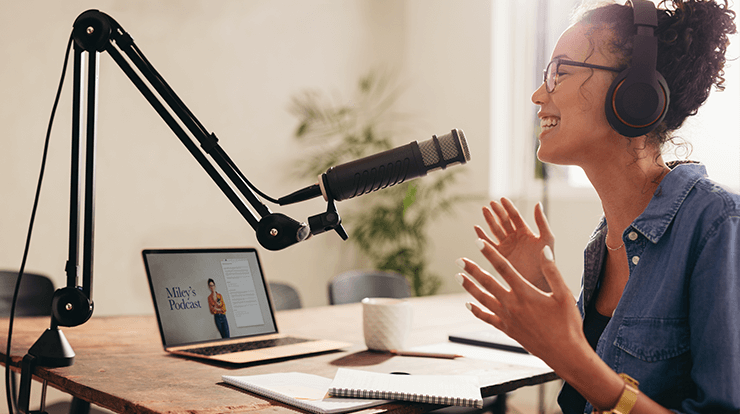
Podcasts
Is There a Podcast in Your Future?
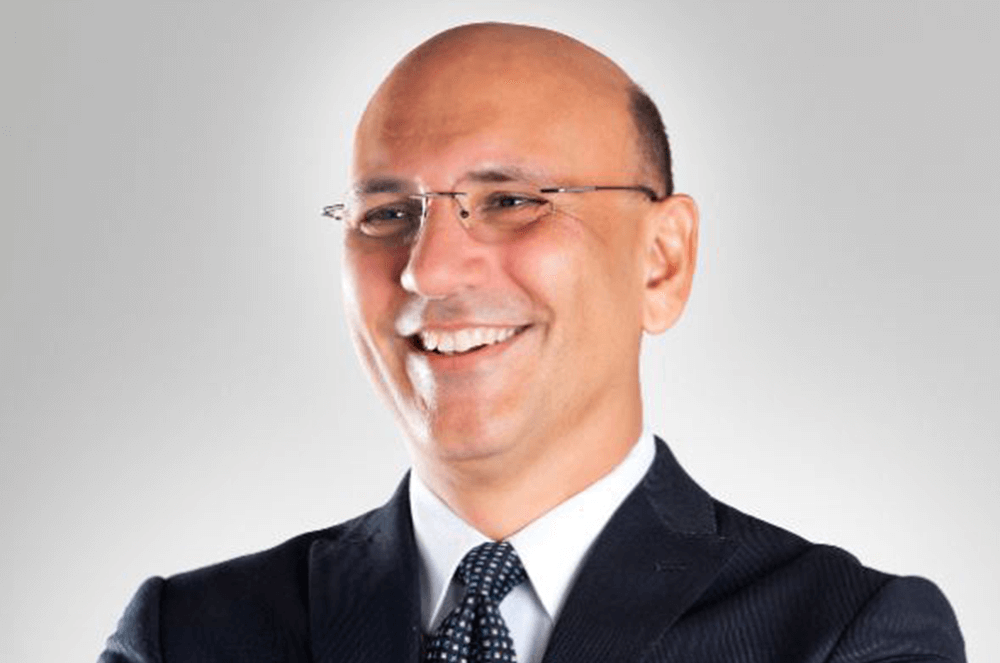
Your Turn
The Power of Podcasting
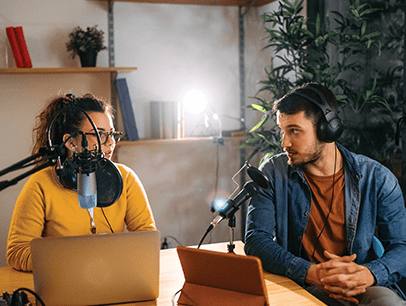
Communication





 How to Listen
How to Listen

